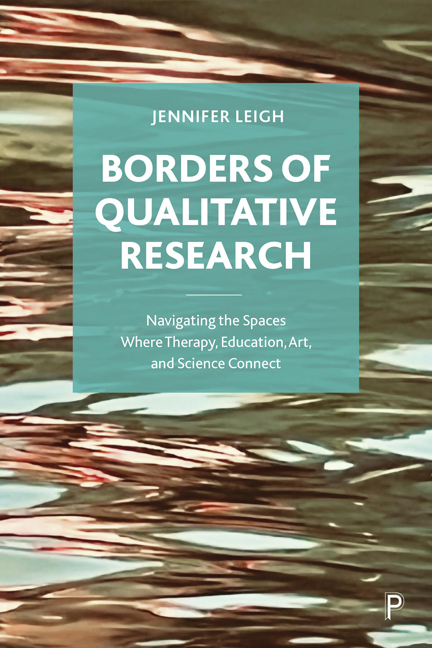 Borders of Qualitative Research
Borders of Qualitative Research Case Study 3 - Working with embodied academics
Published online by Cambridge University Press: 28 March 2024
Summary
This case study highlights issues around positionality, anonymity, autoethnography, ownership, and dissemination in research, and exemplifies the boundaries of qualitative research with art and with therapy. It draws from a study funded by the Society for Research into Higher Education that used a range of creative approaches to explore embodied academic identity. It will explore questions around positionality and visibility in the process, the challenges and opportunities of taking an autoethnographic approach, as well as considering the outcomes of research such as dissemination and the conflicting pressures on academics to produce outputs that ‘count’ and are not messy.
Context
This study came about from a personal need to explore the tensions that I felt about being an academic. I worked in educational development, with responsibility for supporting others to develop their own sense of academic identity. The idea of what an academic is or should be is not always made clear to an early career researcher.
Being an academic is something that is often bound up with a fair amount of mysticism and misperception. In movies and books, academia and campus life can be portrayed as some kind of halcyon idyll, with young people willing to learn, experiment, and have fun under the benevolent guidance of wiser men (and they very often are assumed to be men – a Google image search of ‘what does a professor look like’ displayed 29 white men in the first 22 images returned by this search in June 2021). However, in more recent times this has changed, with academics portrayed as ‘the bookish but socially challenged swot or the egomaniac self-publicist that communicates his or her elevated status at every available opportunity’ (Back 2016: 68). Les Back goes on to say ‘Academics themselves don’t much like other academics, and often feel a deep estrangement from their colleagues as people. Perhaps part of the problem is that our forms of self-presentation are tied to the modern academic desire to be taken seriously – that is, the embodiment of entrepreneurialism, “being smart” and “world-class” braininess.’ Back, along with other commentators and researchers, blames the shifts seen in the ‘modern academic’ on the neoliberal university, which captures academics’ dispositions towards hard work and achievement and overlays them with demands.
- Type
- Chapter
- Information
- Borders of Qualitative ResearchNavigating the Spaces Where Therapy, Education, Art, and Science Connect, pp. 173 - 190Publisher: Bristol University PressPrint publication year: 2023


